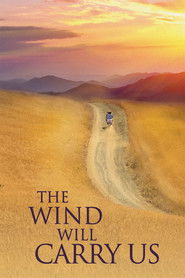As the film comes to a close, and the producer finally packs up to leave the village, professionally unfulfilled but spiritually stirred, we watch as he tosses into a stream a single human bone, a remnant of the past whose future is unwritten. There may be no better metaphor for our post-millennial cinematic landscape.
— Jordan Crook (Slant Magazine)
In one exterior scene, viewed from a balcony, Behzad accidentally drops a green apple to Farzad, who’s on a lower level; it rolls this way and that on a magically unpredictable course — a zigzagging pattern repeated throughout the film, effectively charting the opening shot as well as the last. The recurrence of such patterns in Kiarostami’s work [amounts] to a directorial signature.)[…]
The TV antennas that dot the village help us realize that these people are no more beyond the reach of media than the media people are beyond the reach of the village. The key point is that they speak different body languages, occupy different time frames, and utilize power quite differently.
[…]
The particular ethics of The Wind Will Carry Us consist largely of Kiarostami reflecting on his own practice as a “media person” exploiting poor people: Behzad may be the closest thing in Kiarostami’s work to a critical self-portrait. [Broadly] speaking, he’s implying that there’s no ethical difference between a TV director making a documentary about an old woman’s funeral and a celebrated filmmaker-artist like himself entering a village to make a feature.
[…]
By concentrating on the death of a century-old woman in the year 1999, Kiarostami [seems] to be making some sort of millennial statement — something that possibly means less inside Iran, which has a different calendar. By comically divvying up his world into media “experts” and peasants — moguls with cellular phones and ordinary working people — he’s raising the issue of who owns this world and who deserves to.
[…]
Kiarostami works overtime attempting to rectify that balance and show us things Behzad is unlikely to notice. Perhaps the most impressive of these things is the village itself, with all its intricate interweavings, ambiguities, and declivities — it’s an architectural marvel both as a subject and a backdrop. The Wind Will Carry Us offers an intricately constructed spatial world that’s as breathtakingly beautiful, as various, and as cosmically evocative as a Brueghel landscape — a world teeming with diverse kinds of life and activity — and it teases us whenever we want to get to know this world better, seducing and evading us at the same time.
— Jonathan Rosenbaum (Chicago Reader)

